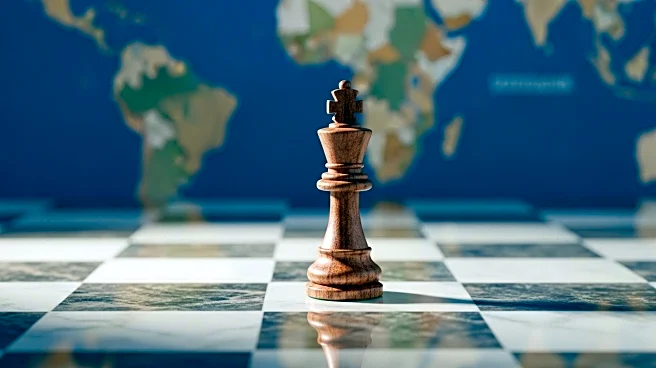What is the story about?
What's Happening?
Vladimir Putin's attempts to assert dominance in geopolitical conflicts have faced significant setbacks, including a loss of influence in regions traditionally aligned with Russia. Despite provocations such as sending drones into European airspace, which led to NATO invoking Article 4, the narrative of Putin's victories has been challenged. Observers in the West have often depicted these actions as victories for Putin, contributing to a perception of his invincibility. However, recent events, including Russia's inability to enforce stability in the Caucasus and strained relations with Azerbaijan, suggest a decline in Russian influence. Additionally, the Kremlin's acknowledgment of shooting down an Azerbaijani civilian jet and the subsequent peace treaty brokered by the United States further highlight Russia's waning control in the region.
Why It's Important?
The diminishing influence of Vladimir Putin has significant implications for global politics and security. As Russia struggles to maintain its sphere of influence, regions like the Caucasus may experience shifts in alliances, potentially leading to increased U.S. involvement and influence. This could alter the balance of power in the region and impact global diplomatic relations. Furthermore, the perception of Putin's invincibility has often been used to justify policy decisions based on fear rather than facts. A more realistic view of his power could lead to more informed and strategic decisions by Western governments, reducing the amplification of threats and posturing by Russia.
What's Next?
The geopolitical landscape may continue to shift as Russia's influence wanes. Countries in the Caucasus and other regions traditionally aligned with Moscow may seek new alliances, potentially increasing U.S. and Western influence. Additionally, the perception of Putin's invincibility may continue to be challenged, leading to more strategic and fact-based policy decisions by Western governments. The ongoing conflict in Ukraine and Russia's military challenges may further impact Putin's ability to project power globally.
Beyond the Headlines
The portrayal of Putin as a near-omnipotent figure has often been used to simplify complex geopolitical narratives. This mythmaking can lead to policy decisions based on fear rather than reality, amplifying threats and posturing by Russia. A more nuanced understanding of Putin's actual capabilities and influence could lead to more strategic and informed decisions by Western governments, reducing the amplification of threats and posturing by Russia.
















